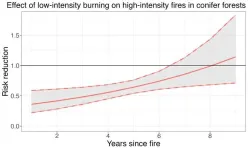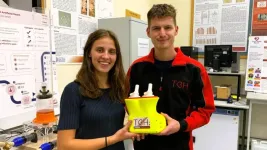(Press-News.org) MSU has a satellite uplink/LTN TV studio and Comrex line for radio interviews upon request.
There is a general understanding that pets have a positive impact on one’s well-being. A new study by Michigan State University found that although pet owners reported pets improving their lives, there was not a reliable association between pet ownership and well-being during the COVID-19 pandemic.
The study, published in the Personality and Social Psychology Bulletin, assessed 767 people over three times in May 2020. The researchers took a mixed-method approach that allowed them to look at several indicators of well-being while also asking people in an open-ended question to reflect on the role of pets from their point of view. Pet owners reported that pets made them happy. They claimed pets helped them feel more positive emotions and provided affection and companionship. They also reported negative aspects of pet ownership like being worried about their pet’s well-being and having their pets interfere with working remotely.
However, when their happiness was compared to nonpet owners, the data showed no difference in the well-being of pet owners and nonpet owners over time. The researchers found that it did not matter what type of pet was owned, how many pets were owned or how close they were with their pet. The personalities of the owners were not a factor.
“People say that pets make them happy, but when we actually measure happiness, that doesn’t appear to be the case,” said William Chopik, an associate professor in MSU’s Department of Psychology and co-author of the study. “People see friends as lonely or wanting companionship, and they recommend getting a pet. But it’s unlikely that it’ll be as transformative as people think.”
The researchers explored several reasons why there is not a difference between the well-being of pet owners and nonpet owners. One of them being that nonpet owners may have filled their lives with a variety of other things that make them happy.
“Staking all of your hope on a pet making you feel better is probably unfair and is maybe costly given other things you could do in your life that could improve your happiness,” added Chopik.
By Shelly DeJong
###
Michigan State University has been advancing the common good with uncommon will for more than 165 years. One of the world's leading research universities, MSU pushes the boundaries of discovery to make a better, safer, healthier world for all while providing life-changing opportunities to a diverse and inclusive academic community through more than 400 programs of study in 17 degree-granting colleges.
For MSU news on the web, go to MSUToday or twitter.com/MSUnews.
END
Do pets make you happier? MSU study shows they didn’t during the pandemic
2023-11-10
ELSE PRESS RELEASES FROM THIS DATE:
Want higher graduation rates? New study shows public spending on families is key
2023-11-10
MSU has a satellite uplink/LTN TV studio and Comrex line for radio interviews upon request.
A new study, conducted in collaboration between researchers at Michigan State University and Central Michigan University, found that public spending on social safety net programs and on education spending each independently impact high school graduation rates, which are a key predictor of health and well-being later in life.
The study, published in the Journal of Adolescent Health, tested whether public financing for education and social safety net programs that aim to help ...
MSU researcher solves sperm mystery, providing insight on infertility
2023-11-10
MSU has a satellite uplink/LTN TV studio and Comrex line for radio interviews upon request.
Video and Images
Michigan State University researchers have solved the mystery of a poorly understood sperm structure called the cytoplasmic droplet, or CD. The CD is an expanded cytoplasm — watery, gel-like cell contents enclosed by cell membrane — found close to the head, at the neck of the sperm, in all mammals, including humans. This new genetic model is the first of its kind.
Despite ...
Are consumers ready for robots to show up at their doorstep?
2023-11-10
With Amazon aiming to make 10,000 deliveries with drones in Europe this year and Walmart planning to expand its drone delivery services to an additional 60,000 homes this year in the states, companies are investing more research and development funding into drone delivery, But are consumers ready to accept this change as the new normal?
Northwestern University’s Mobility and Behavior Lab, led by Amanda Stathopoulos, an associate professor of civil and environmental engineering, wanted to know if consumers were ready for robots to replace delivery drivers, in the form ...
Researchers adapt health system COVID-19 collaboration to track near-real-time trends in visits for substance use
2023-11-10
Minneapolis, Minn. – In a recently released study, researchers at Hennepin Healthcare and other Minnesota health systems describe how a COVID-19 collaboration across Minnesota health systems was adapted to monitor near-real-time trends in substance use–related hospital and emergency department (ED) visits.
The Minnesota Electronic Health Record Consortium (MNEHRC), developed in response to the COVID-19 pandemic, repurposed its surveillance methods to identify health disparities and inform equity-driven approaches to the overdose epidemic.
MNEHRC’s study, "Minnesota Data Sharing May Be Model for Near-Real-Time Tracking of Drug Overdose Hospital ...
RIT’s Carichino receives National Science Foundation LEAPS-MPS award
2023-11-10
Rochester Institute of Technology’s Lucia Carichino, assistant professor in the School of Mathematics and Statistics, has received a Launching Early-Career Academic Pathways in the Mathematical and Physical Sciences (LEAPS-MPS) award from the National Science Foundation (NSF).
The award funds Carichino’s research in computational modeling of the interaction between the eye and a contact lens. Specifically, Carichino is focusing on orthokeratology (ortho-k) lenses that help reduce myopic progression in kids and young adults. She aims to develop a mathematical model that will ...
A closer look at rebel T cells
2023-11-10
LA JOLLA, CA—Scientists at La Jolla Institute for Immunology (LJI) are investigating a talented type of T cell.
Most T cells only work in the person who made them. Your T cells fight threats by responding to molecular fragments that belong to a pathogen—but only when these molecules are bound with markers that come from your own tissues. Your influenza-fighting T cells can't help your neighbor, and vice versa.
"However, we all have T cells that do not obey these rules," says LJI Professor and President Emeritus Mitchell Kronenberg, Ph.D. "One of these cell types is mucosal-associated invariant ...
Low-intensity fires reduce wildfire risk by 60%, according to study by Columbia and Stanford researchers
2023-11-10
There is no longer any question of how to prevent high-intensity, often catastrophic, wildfires that have become increasingly frequent across the Western U.S., according to a new study by researchers at Stanford and Columbia universities. The analysis, published Nov. 10 in Science Advances, reveals that low-intensity burning, such as controlled or prescribed fires, managed wildfires, and tribal cultural burning, can dramatically reduce the risk of devastating fires for years at a time. The findings – some of the first to rigorously quantify the value of low-intensity fire – come while Congress is reassessing the U.S. Forest Service’s ...
Unlocking the secrets of spin with high-harmonic probes
2023-11-10
Deep within every piece of magnetic material, electrons dance to the invisible tune of quantum mechanics. Their spins, akin to tiny atomic tops, dictate the magnetic behavior of the material they inhabit. This microscopic ballet is the cornerstone of magnetic phenomena, and it's these spins that a team of JILA researchers—headed by JILA Fellows and University of Colorado Boulder professors Margaret Murnane and Henry Kapteyn—has learned to control with remarkable precision, potentially redefining the future of electronics and data storage.
In a new Science Advances ...
University of Minnesota Medical School researchers investigate cause of cardiomyopathy in coronary artery disease using cardiac MRI
2023-11-10
MINNEAPOLIS/ST. PAUL (11/10/2023) — Researchers from the University of Minnesota Medical School examining the cause of cardiomyopathy discovered one out of every six patients with coronary artery disease had non-ischemic or dual cardiomyopathy.
The findings of this study were published this week in the peer-reviewed journal Circulation, the flagship journal of the American Heart Association.
Cardiomyopathies are diseases of the heart muscle. Patients with coronary artery disease can have cardiomyopathy from heart muscle ...
Heart of Gold: Bath student team wins world Heart Hackathon competition
2023-11-10
Student engineers from the University of Bath are on top of the world after winning an international competition to design an artificial heart.
Team Bath Heart took top prize at the grand final of the first-ever Heart Hackathon, which was held in Texas at the end of October.
Six members of the team presented their device to global experts in artificial heart technologies, competing against teams from Australia, the United States, Sweden, New Zealand, Romania and Egypt.
The ‘total artificial heart’ ...


